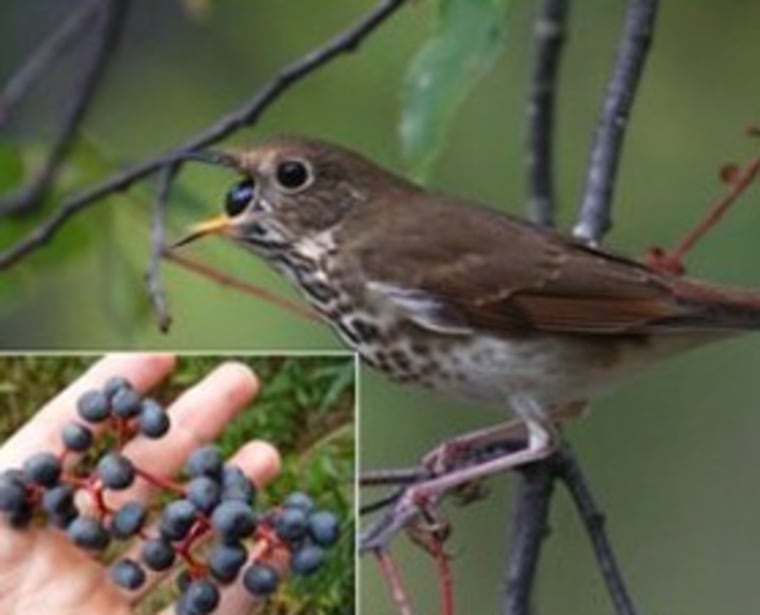Bug-chomping songbirds have been discovered doing something remarkable before migrating south for the winter: They switch, awkwardly, to berries rich in antioxidants.
The dietary change has less to do with fattening up and more to do with stocking up on nutrients to help their bodies deal with the stresses of migration, say researchers.
"It has been known for some time, this phenomenon of birds switching to fruits in the fall," said bird researcher Scott McWilliams of the University of Rhode Island. It was assumed that the birds were packing in extra fats or carbs during cooler weeks when insects were on the wane. "But that didn't explain it enough."
So McWilliams teamed up with Navindra Seeram, the head of the same university's Bioactive Botanical Research Laboratory to see what was up with the fruits birds were choosing.
"Our colleague is very much a biochemist," said McWilliams. "His field is looking for compounds in nature that might have human benefits."
To collect the same berries as the birds were choosing, graduate student Jessica Bolser spent months in the field on Block Island, off the eastern tip of Rhode Island. Batches of 12 kinds of berries were brought back Seeram's lab where researcher Liya Li got to work on them.
"It's a fairly sophisticated biochemical analysis," said McWilliams. The work was presented Wednesday at the meeting of the American Chemical Society in San Francisco.
"This study is one of the new generation of bird food studies that is … not just looking at energy and protein but looking at micronutrients," said ecologist Douglas Levey of the University of Florida in Gainesville.
"The whole twist of looking at the antioxidant qualities is novel," agreed migratory bird researcher David Bonter of the Cornell Lab of Ornithology. You have these birds — sparrows, thrushes, warblers and such — that have evolved very specialized beaks for eating insects suddenly switching to fruits. "They look clumsy and ridiculous."
As for how the birds do it, it would appear to be something that has evolved jointly between the berry plants and the birds, said Bonter. The birds get the nutritional benefits and the plants get their seeds dispersed when the birds defecate.
The fruit-picking behavior itself, however, is not likely something the birds learn, Bonter said. At the time the birds are readying to migrate many are eight to nine weeks old and on their own.
"There must be some compounds in the fruit that serves as attractions," said Bonter. "My guess is there are young birds testing a lot of fruit."
The discovery also raises another intriguing question: Is something similar is happening with food choices for birds in the tropical wintering grounds.
"Wintering birds do have a more omnivorous diet," said Bonter. And birds from huge tracts of northern lands pack into tight wintering grounds, which has to be stressful. So it might be interesting to see if the birds are looking for antioxidants in the tropics as well, he said.
The discovery also hints at a new way biochemists might search for useful substances in nature: follow the wildlife.
